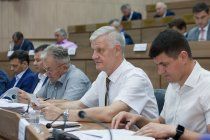 Русский
Русский English
English-







Broadcast of court hearings
The court hearings can be broadcast on radio, television and the global Internet. The Supreme Council adopted the corresponding package of legislations of a group of deputies of the Committee on Education, Public Associations and the Media in the first reading. According to the authors, the changes will ensure citizens' access to justice, maximum openness and transparency of the courts.
Both the courts and the parties to the pending case can initiate the broadcast. The court gives permission. For example, there is information that constitutes a secret protected by law. Closed court hearings are prohibited from broadcasting. The minutes of the court session will be marked with the use of audio and video recording, photography or broadcasting by means of modern technologies.
The texts of judicial acts posted on the Internet should not include the personal data of the participants in the trial, the full name, date and place of birth, passport details, phone numbers and other data will not be published. Initials, pseudonyms and other designations are placed that do not allow identifying the participants in the trial instead of them.
Amendments are being made to the constitutional law "On the Constitutional Court", to the Code of Administrative Offenses, the Arbitration and Civil Procedure Codes, to the laws "On Personal Data" and "On Providing Access to Information on the Activities of the PMR Courts".
The relevant committee on legislation will continue to work on legislations for their adoption in the second reading.
Today the deputies considered amendments to the Constitutional Law "On the Constitutional Court of the PMR". Citizens will have the opportunity to submit an appeal to the Constitutional Court in electronic form. Such a document must be signed with an electronic signature. A special form can be filled out on the official website of the Constitutional Court in the “Electronic petition system” section. The law-in-draft was adopted in the second final reading and sent for signature to the President.




